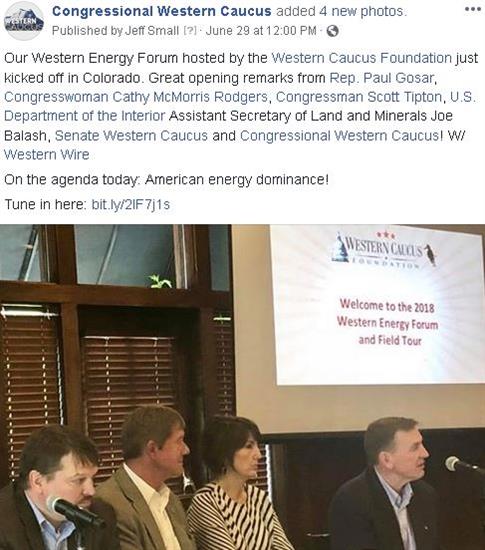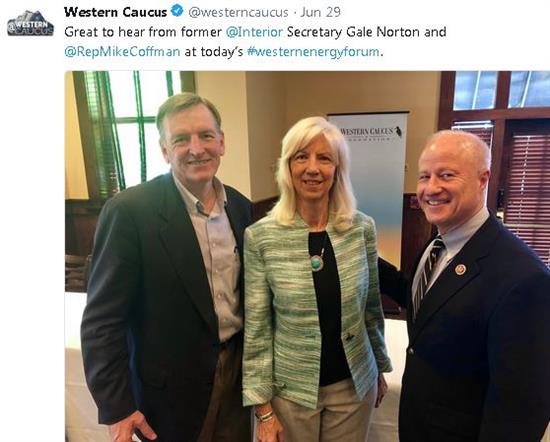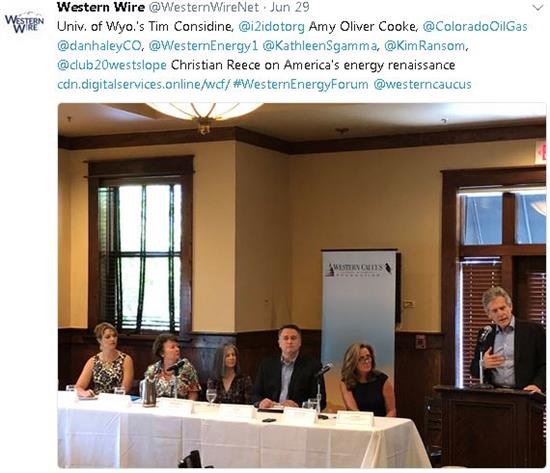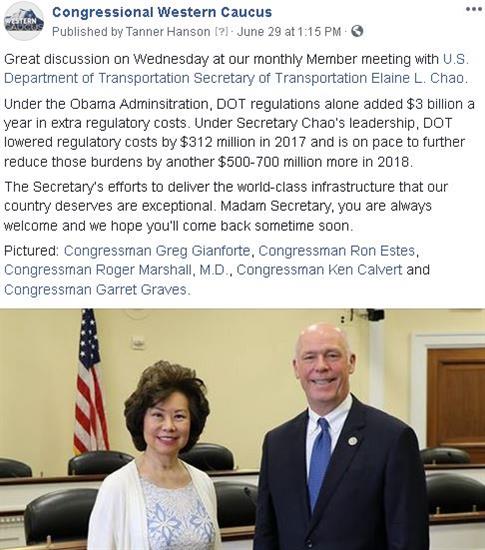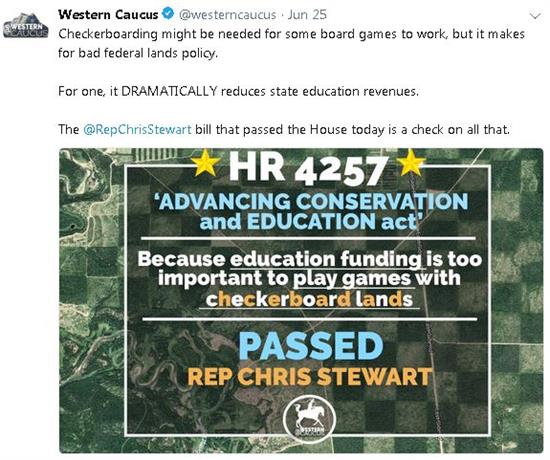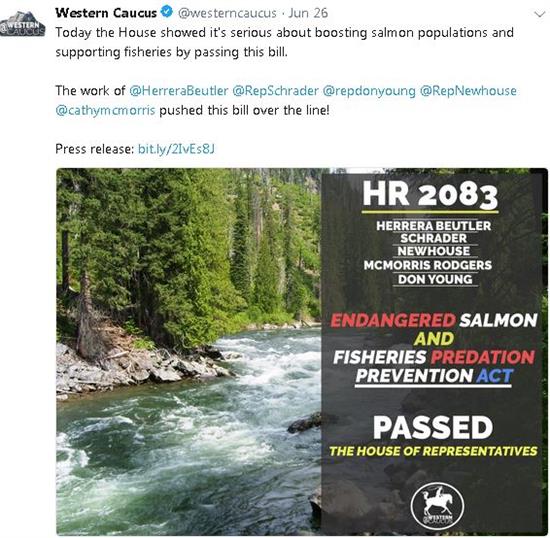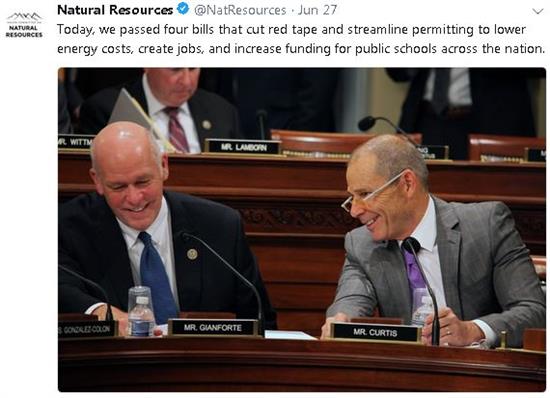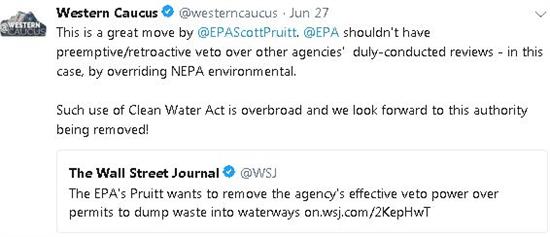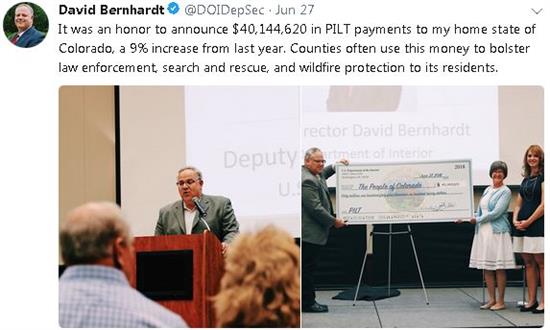 |
Week of 7.1.18
#AmericanEnergyDominance
|
|||
|
|||
| On Friday, our Members and staff participated in a Western Energy Forum with local stakeholders hosted by the Western Caucus Foundation. Chairman Paul Gosar, House GOP Chairwoman Cathy McMorris Rodgers, Executive Vice-Chairman Scott Tipton, Western Caucus Member Rep. Mike Coffman, former U.S. Department of the Interior Secretary Gale Norton, U.S. Department of the Interior Assistant Secretary of Land and Minerals Joe Balash as well as numerous staff from the House and Senate Western Caucuses made the trip to Colorado. As reported by Western Wire, former Secretary Norton discussed new climate change lawsuits that aim to prevent responsible energy production. “Today I’m focusing on a new breed of environmental litigation, one that is as different from [prior] litigation as a lion is from a house cat,” said former Interior Secretary Gale Norton.“Climate change litigation has moved into the Rocky Mountains,” Norton said. “Climate change debates are nothing new, but aspects of this litigation are significant.”
The Western Energy Forum had great participation and comments from local stakeholders including: University of Wyoming's Tim Considine, Independence Institute's Amy Oliver Cooke, Colorado Oil & Gas Association's Dan Haley, Western Energy Alliance's Kathleen Sgamma, State Representative Kim Ransom, CLUB 20's Christian Reece, Global Energy Institute's Christopher Guith, Xcel Energy's Frank Prager, Arizona Public Service's Jeff Burke and Consumer Energy Alliance's Andrew Browning.
|
|||
Following this informative discussion, ConocoPhillips gave our Members and staff a behind the scenes tour of some of their drilling, hydraulic fracturing and well operations. |
|||
|
|||
| Department of Transportation Unshackling Job Creators |
|||
|
|||
On Wednesday, Department of Transportation Secretary Elaine L. Chao joined our Members for our monthly Member meeting. Under the Obama Administration, DOT regulations alone added $3 billion a year in extra regulatory costs. Under Secretary Chao’s leadership, DOT lowered regulatory costs by $312 million in 2017 and is on pace to further reduce those burdens by another $500-700 million more in 2018. The Secretary’s efforts to deliver the world-class infrastructure that our country deserves are exceptional.
|
|||
House Passes the Advancing Conservation and Education Act |
|||
|
|||
| On Monday, the House passed Chief Defense and Interior Officer Chris Stewart's bill, H.R. 4257. This common sense piece of legislation allows for the consolidation of different checkerboards of state and federal lands in Western states in order to maximize their efficiency. |
|||
House Passes Bill to Protect Pacific Northwest Fisheries |
|||
On Tuesday, the House passed H.R. 2083, the Endangered Salmon and Fisheries Predation Prevention Act, by a bipartisan vote of 288-116. "With today’s passage of my bipartisan bill to improve the survival of endangered salmon and steelhead, we’re taking a giant step forward in restoring an ecosystem sorely out of balance. The sea lion predation problem on the Columbia River will not go away without intervention from local and tribal managers, and I’m pleased that we’re now able to give these officials the tools they need to remove the most problematic sea lions and protect our native fish runs for generations to come," stated Congresswoman Jaime Herrera Beutler. “Salmon are an important part of the culture, identity, and the economy of the people and tribes of the Pacific Northwest. It is one of the reasons why we’ve, as a region, put so much time, energy, and resources into protecting and recovering these iconic fish,” said Congressman Kurt Schrader. “Our bill will provide the states and tribal members the flexibility they need to protect these endangered fish and manage the threat posed by sea lion predation. I’m very pleased to have the support of so many of my colleagues in the House in tackling this issue in a bipartisan, thoughtful way. I want to thank Rep. Herrera Beutler and our states, tribes, and local communities for all of the hard work everyone has put in over several years now on this legislation and on working towards solutions to save our salmon.” |
|||
| Resources Committee Passes Multiple Onshore Energy Bills |
|||
|
|||
|
“The energy industry, the lifeblood of our economy in Wyoming, has been severely burdened by lengthy and often frivolous protests on energy projects. I’m proud my bill will help stop the abuses of this system by charging a nominal fee for protests of oil and gas lease sales, applications for permit to drill, and right of way applications. The Removing Barriers to Energy Independence Act brings much needed and long overdue relief to Wyoming oil and gas operators,” Congresswoman Cheney stated. “Energy independence is a vital step forward for our nation’s well-being. Improving the federal government’s slow permitting process is essential for making this great step forward. I have greatly enjoyed working with the Natural Resources Committee on this important bill. I thank my colleagues for joining with me to keep this bill moving towards the House Floor,” Congressman Pearce said. “This bill will help ensure that Utah’s rural communities are growing by speeding up the burdensome approval process for responsible energy projects. I’m delighted to see this legislation move forward. It’s a victory for Utah and American energy independence,” Congressman Curtis stated. “The Education and Energy Act is a win-win for the nation. This bill would allow us to provide more funding for K-12 and public higher education, all while creating good paying jobs, lowering energy prices, and setting the stage for U.S. energy resources to be exported to our allies. Property taxes continue to be the largest source of funding for the public school system, so in rural counties in my district, where a majority of land is owned by the federal government and therefore not taxable, education budgets are tight,” continued Tipton. “The Education and Energy Act would fix this disparity by sending more of the federal revenues back to the county from which the royalties were derived,” Congrssman Tipton said. To read the full release from the House Committee on Natural Resources click here. |
|||
| EPA Acts to Prevent Future Preemptive and Retroactive Vetoes |
|||
|
“Today’s memo refocuses EPA on its core mission of protecting public health and the environment in a way that is fair and consistent with due process,” said EPA Administrator Scott Pruitt. “We must ensure that EPA exercises its authority under the Clean Water Act in a careful, predictable, and prudent manner.” The Western Caucus called for such reforms in a May 3rd letter stating at the time that "preemptive project vetoes are a tool of tyranny." |
|||
| |
|||
|
|||
|
|||
 |

